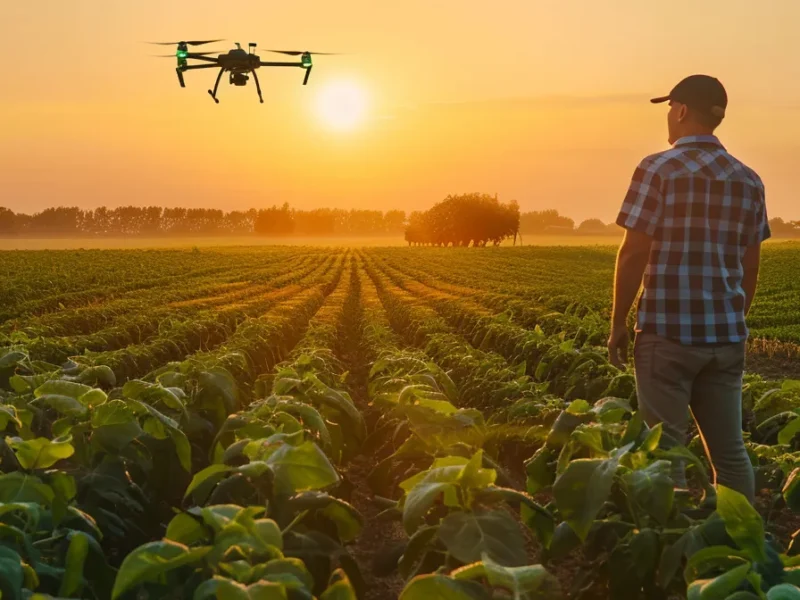Top Resources Every Commercial Farmer Needs
The backbone of our society in many ways lies in the agricultural sector, where commercial farming plays a crucial role in feeding the population and driving economic growth. With advances in technology and practices, the landscape of farming has changed dramatically, requiring farmers to be equipped with the best tools and knowledge to thrive. To succeed in the competitive modern agricultural arena, having access to the right resources is non-negotiable. Keep reading to discover the essential resources every commercial farmer needs to maximize productivity and efficiency.
Leveraging Agricultural Technology for Improved Efficiency
Tech innovations are revolutionizing commercial farming, enabling automated guidance systems, data analytics, drones, satellite imagery, RFID technology, and the Internet of Things (IoT) to improve efficiency and accuracy. Automated guidance systems enable tractors and machinery to operate with minimal human intervention, while data analytics provide farmers with insights for planting decisions, soil management, and yield predictions.
Drones and satellite imagery provide aerial views of fields, allowing for real-time assessments of plant health, pests, and crop performance. RFID technology is crucial for livestock management, enabling easy tracking of individual animals’ health, productivity, and location, simplifying record-keeping and enhancing safety. Integrating advanced technology like robotics, artificial intelligence, and IoT into agricultural operations has made precision farming a reality, enabling farmers to achieve higher crop production levels with reduced inputs, ultimately increasing their farm’s bottom line.
Farm Management Software: Streamlining Operations
Farm management software is a crucial tool for farmers, providing a central hub for tracking all aspects of farm operations, from crop planting to financial management. Cloud-based solutions offer flexibility in accessing data from anywhere, on any device. Inventory control modules ensure stock levels are maintained, and systems can integrate with supply chain partners for seamless order confirmation.
Digital tools simplify record-keeping, allowing farmers to quickly enter and retrieve information for compliance with regulations and audit purposes. Accurate records maintain transparency and accountability. Management software can also analyze historical data to forecast trends and predict future farm performance, providing insights for continuous improvement. These systems oversee the entire life cycle of crops or livestock with precision.
The Essentials of Modern Commercial Farming Equipment
A successful commercial farm relies heavily on advanced equipment like tractors, combine harvesters, and plows. Modern machinery, equipped with GPS technology, enhances efficiency and conserves resources. Automated irrigation systems and intelligent fertilizer spreaders ensure optimal crop hydration and soil nutrient levels.
For livestock farmers, robotic milking machines and automatic feeding systems boost productivity, while climate-controlled housing ensures animal comfort. Equipment needs vary by farm type and location, making it crucial to select adaptable, reliable tools. Alberta Agricultural Building Construction offers valuable solutions for housing farming operations and equipment.
The Role of Irrigation Systems in Maximizing Crop Yields

Water is a vital resource for agriculture, and modern irrigation systems have advanced to conserve water and prevent problems like waterlogging and soil erosion. Technology allows for smart integration of sensors and timers, allowing for real-time weather-based watering schedules. Variable rate irrigation systems adjust water delivery to specific crop needs.
A well-planned irrigation system also enhances nutrient management by combining watering and feeding in fertigation, promoting optimal plant growth without over-fertilization. The longevity and reliability of these systems are crucial, as farms rely on consistent water supply. Regular maintenance checks and upgrades can prevent costly downtimes and ensure the irrigation system remains a valuable asset, contributing to sustainability and profitability.
Understanding the Importance of Soil Testing Kits and Nutrient Management Tools
Soil health is crucial for successful crop growth, and soil testing kits have become essential tools for farmers. These kits provide detailed insights like pH levels, nutrient content, and potential contaminants, guiding farmers in adjusting soil amendments and fertilizers to optimize crop yield and quality. Precision agriculture practices use soil tests to minimize fertilizer use and address nutrient deficiencies, ensuring sustainable agribusiness practices.
Combining soil sensors with testing kits enables real-time monitoring of moisture and nutrient levels, supporting precise fertilization that enhances crop health and minimizes environmental impact, including nutrient runoff. Embracing these tools, alongside innovations like Esso Diesel for efficient farming fuel, is key to sustainable farming practices and preserving fertile land for future generations.
Altogether, commercial farming has evolved into a high-tech industry, necessitating a range of tools and knowledge. Innovations in equipment, technology, farm management software, irrigation systems, and soil management are essential for modern farmers to enhance productivity and sustainability, while also promoting sustainable practices.








 7 Tips For Creating Healthy Sleep Habits
7 Tips For Creating Healthy Sleep Habits